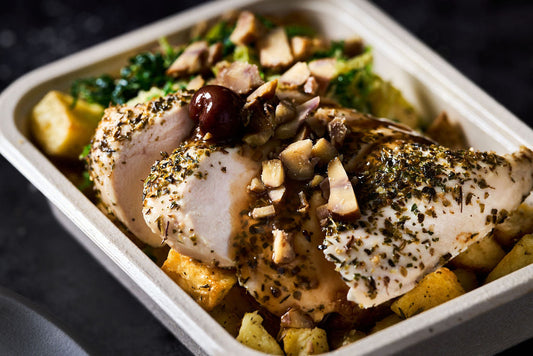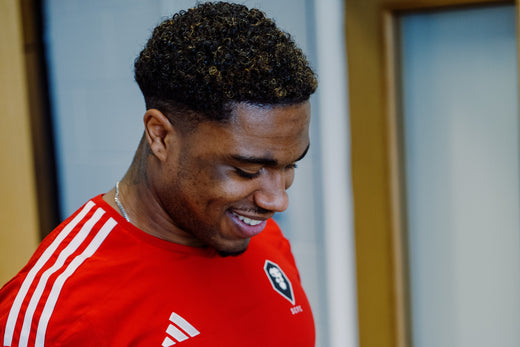In rugby, strength, speed, and stamina are built on more than just training drills and gym sessions. Nutrition is the silent partner that fuels every tackle, sprint, and score.
Whether you aim to train like a rugby player or follow a professional rugby player diet plan, mastering your meals can be your key to success.
Nutrition Basics for Rugby Players
Rugby players demand a lot from their bodies, making it essential to balance macronutrients strategically. Proteins are crucial for muscle repair and growth, carbohydrates provide the energy to power through matches and training, and healthy fats support overall endurance and joint health.
Micronutrients and hydration are equally important, ensuring players recover efficiently and maintain peak physical condition. The overarching goal of a rugby diet plan? To fuel performance and optimise recovery while tailoring nutrition to the unique demands of match days, training, and rest days.
A Day in the Life: Eating Like a Pro Rugby Player
Let’s break down a typical day in the rugby player's diet plan:
-
Breakfast: A professional rugby player begins their day with a nutrient-dense breakfast. This meal focuses on complex carbohydrates for sustained energy, lean protein for muscle maintenance, and healthy fats. An example would be our vanilla overnight oats breakfast with date toffee and bananas. This combination provides slow-releasing energy from the oats while bananas can ease muscle cramps due to training.
-
Mid-Morning Snack: Between meals, snacks play a vital role in maintaining energy levels. Greek yoghurt with a handful of mixed nuts or a protein smoothie with banana and spinach can help fuel mid-morning training sessions without weighing players down.
-
Lunch: Lunch is a critical meal for rugby players, especially on training days. A balanced plate might include grilled chicken or salmon, quinoa or sweet potato, and a variety of steamed vegetables. For example, try our teriyaki salmon meal with jasmine rice and stir-fried vegetables. Adding a drizzle of olive oil or avocado provides healthy fats, which aid in reducing inflammation and boosting endurance.
-
Afternoon Snack: To prepare for afternoon training or support recovery post-session, snacks like rice cakes with peanut butter and sliced banana or a recovery shake with whey protein, spinach, and berries are common choices. These options replenish glycogen stores and deliver essential nutrients to tired muscles.
-
Dinner: Dinner prioritises protein for muscle repair and complex carbohydrates for glycogen restoration. Grilled turkey, chicken, or lean beef with whole-grain pasta, roasted vegetables, and a side salad is a rugby player’s recovery dream meal. For instance, check out our Italian chicken pasta meal with broccoli and parmesan. The addition of anti-inflammatory foods, such as turmeric or omega-3-rich salmon, further supports recovery.
-
Evening Snack: Before bed, a light snack like cottage cheese with pineapple or a small serving of casein protein ensures a steady release of amino acids during sleep. This final meal supports muscle repair and keeps players energised for the next day.
Customising Nutrition for Specific Goals
A professional rugby player’s diet plan isn’t static — it evolves based on individual goals, such as muscle gain, fat loss, or match-day preparation.
If your goal is to gain muscle, for instance, emphasise calorie-dense foods like nut butters, whole grains, and lean meats, with a focus on these foods for resistance training days. For losing fat, be sure to incorporate plenty of vegetables, lean proteins, and healthy fats while moderating carbohydrate intake to align with lighter training loads.
If your role on the team influences your nutrition, tailoring your diet to suit positional demands will be key:
-
Wingers and backs — who need to be lean, quick, and agile for fast sprints and evasive running — should focus on lean proteins, plenty of vegetables, and controlled carbohydrate intake to stay light on their feet.
-
For forwards, particularly props and locks, the priority is maintaining size and strength for scrums and heavy tackling. Calorie-dense foods like red meat, whole grains, and healthy fats are essential to support muscle mass and overall power.
-
Players aiming for endurance — such as half-backs — will benefit more from balanced meals rich in carbs and proteins to sustain energy over prolonged play.
If you’re planning to fuel up in preparation for a match day, carb loading begins 24-48 hours before a game. A dinner of whole-grain pasta and chicken, paired with a pre-match breakfast of porridge and fruit, will help to ensure optimal glycogen stores. Mid-game, opt for quick sources of energy like sports drinks or energy gels to keep you sharp.
The 7-Day Meal Plan for Rugby Players
Playing this sport professionally calls for a rugby meal plan that means business. For those looking to train like a pro rugby player, here’s a simplified sample 7-day meal plan:
-
Day 1 (Heavy Training): Protein pancakes for breakfast, chicken and rice for lunch, salmon and quinoa for dinner.
-
Day 2 (Light Training): Smoothie bowls for breakfast, tuna salad for lunch, steak with vegetables for dinner.
-
Day 3 (Recovery): Egg-white omelette for breakfast, lentil soup for lunch, baked cod with roasted vegetables for dinner.
-
Day 4 (Match Day): Oatmeal and banana for breakfast, pasta and lean meat for lunch, post-match recovery shake, and light evening meal – such as our hunter’s BBQ chicken meal.
-
Day 5 (Post-Match): Hydrating smoothie with protein for breakfast, balanced macro-meal for lunch, and anti-inflammatory-rich dinner.
-
Day 6 (Moderate Training): Scrambled eggs and toast for breakfast, turkey wrap for lunch, beef stir-fry for dinner.
-
Day 7 (Rest Day): Yoghurt and granola for breakfast, avocado toast for lunch, and grilled vegetables with lean meat for dinner.
Wrapping Up
If you’re playing rugby, the right nutrition isn’t optional — it’s a game-changer. The professional rugby player diet plan focuses on nutrient timing, balance, and tailoring to individual needs. Whether it’s a 7-day meal plan for rugby players or a match-day strategy, the emphasis is always on fueling performance and supporting recovery. Here at FuelHub, we take your goals — sport- and diet-wise — seriously. Eat like a pro with our nutritious ready meals, and you’ll not only dominate the pitch but also feel unstoppable off it.


